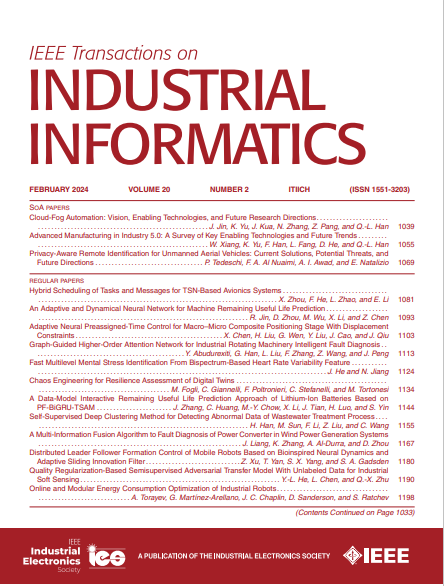多模过程质量预测中回声状态网络的连续半监督学习
IF 9.9
1区 计算机科学
Q1 AUTOMATION & CONTROL SYSTEMS
引用次数: 0
摘要
多模式过程的连续切换特性,加上数据的稀缺性,对传统的质量预测模型提出了挑战。具体来说,很难同时从所有模式中收集大量标记数据集,这迫使模型在模式切换时更新其参数。这导致了历史模式知识的遗忘,阻碍了知识的聚集,从而降低了模式间的泛化。为此,我们提出了一种新的连续半监督图回声状态网络($\text{CS}^{2}$GESN)。首先,基于图平滑假设设计半监督图回声状态网络($\text{S}^{2}$GESN),从每个模式内的未标记样本中提取动态信息。然后,$\text{S}^{2}$GESN模型演变为一个连续模型$\text{CS}^{2}$GESN,该模型采用弹性权值整合策略对伪逆参数优化得到的参数重要性估计进行估计,有利于历史学习知识的积累。这种方式减轻了由于数据稀缺和信息遗忘导致的性能下降,并且能够更灵活地对连续到达的操作模式进行建模。通过对田纳西伊士曼工艺和三相流装置工艺的应用,证明了该方法的优越性和可行性。本文章由计算机程序翻译,如有差异,请以英文原文为准。
Continual Semisupervised Learning of Echo State Network for Quality Prediction of Multimode Processes
The successive switching nature of multimode processes, coupled with data scarcity, challenges traditional quality prediction models. Specifically, the difficulty of simultaneously collecting abundant labeled datasets from all modes forces the model to update its parameters as modes switch. This leads to the forgetting of historical mode knowledge and hinders the aggregation of knowledge, thereby degrading generalization across modes. To this end, we propose a novel continual semisupervised graph echo state network ($\text{CS}^{2}$ $\text{S}^{2}$ $\text{S}^{2}$ $\text{CS}^{2}$
求助全文
通过发布文献求助,成功后即可免费获取论文全文。
去求助
来源期刊

IEEE Transactions on Industrial Informatics
工程技术-工程:工业
CiteScore
24.10
自引率
8.90%
发文量
1202
审稿时长
5.1 months
期刊介绍:
The IEEE Transactions on Industrial Informatics is a multidisciplinary journal dedicated to publishing technical papers that connect theory with practical applications of informatics in industrial settings. It focuses on the utilization of information in intelligent, distributed, and agile industrial automation and control systems. The scope includes topics such as knowledge-based and AI-enhanced automation, intelligent computer control systems, flexible and collaborative manufacturing, industrial informatics in software-defined vehicles and robotics, computer vision, industrial cyber-physical and industrial IoT systems, real-time and networked embedded systems, security in industrial processes, industrial communications, systems interoperability, and human-machine interaction.
 求助内容:
求助内容: 应助结果提醒方式:
应助结果提醒方式:


